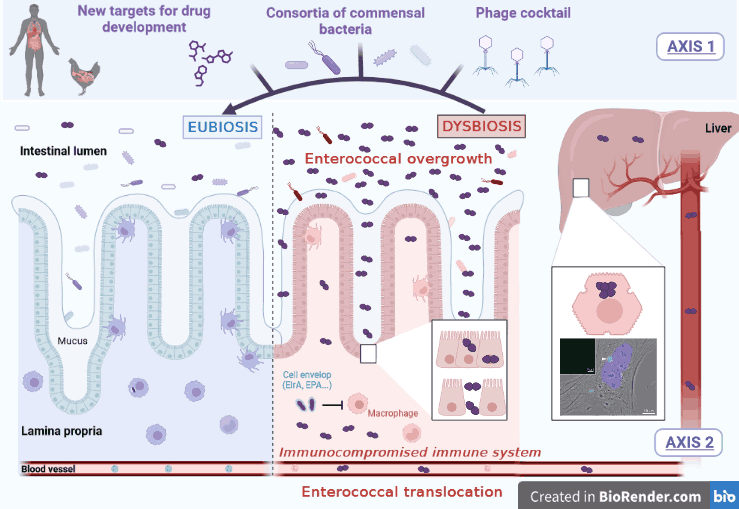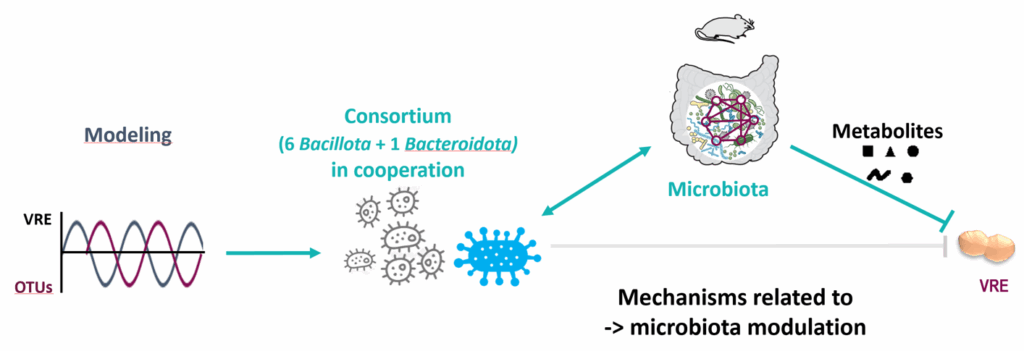- A consortium of seven commensal bacteria promotes gut microbiota recovery and strengthens ecological barrier against vancomycin-resistant enterococci
Alan Jan , Perrine Bayle, Nacer Mohellibi, Clara Lemoine, Frédéric Pepke, Fabienne Béguet-Crespel, Isabelle Jouanin, Marie Tremblay-Franco, Béatrice Laroche, Pascale Serror, Lionel Rigottier-Gois. Microbiome. 2025 May 26;13(1):129.doi: 10.1186/s40168-025-02127-5 - The virtue of training: extending phage host spectra against vancomycin-resistant Enterococcus faecium strains using the Appelmans method.
Lossouarn J, Beurrier E, Bouteau A, Moncaut E, Sir Silmane M, Portalier H, Zouari A, Cattoir V, Serror P, Petit M-A. Antimicrob Agents Chemother. 2024 May 2;68(5):e0143923. doi: 10.1128/aac.01439-23. - Enterococcus faecalis: an overlooked cell invader.
Archambaud C, Nunez N, da Silva RAG, Kline KA, Serror P. Microbiol Mol Biol Rev. 2024 Sep 26;88(3):e0006924. doi: 10.1128/mmbr.00069-24. - Laurentie J, Loux V, Hennequet-Antier C, Chambellon E, Deschamps J, Trotereau A, Furlan S, Darrigo C, Kempf F, Lao J, Milhes M, Roques C, Quinquis B, Vandecasteele C, Boyer R, Bouchez O, Repoila F, Le Guennec J, Chiapello H, Briandet R, Helloin E, Schouler C, Kempf I, Serror P. Comparative genome analysis of Enterococcus cecorum reveals intercontinental spread of a lineage of clinical poultry isolates. mSphere 2023, 8(2). 2 DOI: 10.1128/msphere.00495-22.
- Repoila F, Le Bohec F, Guérin C, Lacoux C, Tiwari S, Jaiswal AK, Santana MP, Kennedy SP, Quinquis B, Rainteau D, Juillard V, Furlan S, Bouloc P, Nicolas P, Miyoshi A, Azevedo V, Serror P. Adaptation of the gut pathobiont Enterococcus faecalis to deoxycholate and taurocholate bile acids. Sci Rep. 2022;12(1):8485. doi: 10.1038/s41598-022-12552-3.Article #3 DOi
- Nunez N, Derré-Bobillot A, Trainel T, Lakisic G, Lecomte A, Mercier-Nomé F, Cassard AM, Bierne H, Serror P & Archambaud A. The unforeseen intracellular lifestyle of Enterococcus faecalis in hepatocytes. Gut Microbes 2022; 14:1, DOI: 10.1080/19490976.2022.2058851.
- Guerardel Y, Sadovskaya I, Maes E, Furlan S, Chapot-Chartier MP, Mesnage S, Rigottier-Gois L, Serror P. Complete structure of the Enterococcal Polysaccharide Antigen (EPA) of vancomycin-resistant Enterococcus faecalis V583 reveals that EPA decorations are teichoic acids covalently linked to a rhamnopolysaccharide backbone. mBio 2020; 28;11(2). pii: e00277-20. doi: 10.1128/mBio.00277-20.
- Furlan S, Matos RC, Kennedy SP, Doublet B, Serror P, Rigottier-Gois L. Fitness restoration of a genetically tractable Enterococcus faecalis V583 derivative to study decoration-related phenotypes of the enterococcal polysaccharide antigen. mSphere 2019; 10;4(4). pii: e00310-19. doi: 10.1128/mSphere.00310-19.
- Crouzet L, Derrien M, Cherbuy C, Plancade S, Foulon M, Chalin B, van Hylckama Vlieg JET, Grompone G, Rigottier-Gois L, Serror P. Lactobacillus paracasei CNCM I-3689 reduces vancomycin-resistant Enterococcus persistence and promotes Bacteroidetes resilience in the gut following antibiotic challenge. Sci Rep. 2018; 23;8(1):5098. doi: 10.1038/s41598-018-23437-9.
- Innocenti N, Golumbeanu M, Fouquier d’Hérouël A, Lacoux C, Bonnin RA, Kennedy SP, Wessner F, Serror P, Bouloc P, Repoila F, Aurell E. Whole-genome mapping of 5′ RNA ends in bacteria by tagged sequencing: a comprehensive view in Enterococcus faecalis. RNA. 2015;21(5):1018-30. doi : 10.1261/rna.048470.114
- Rigottier-Gois L, Madec C, Navickas A, Matos RC, Akary-Lepage E, Mistou MY, Serror P. The surface rhamnopolysaccharide Epa of Enterococcus faecalis is a key determinant for intestinal colonization. J Infect Dis. 2015; 211(1):62-71. doi : 10.1093/infdis/jiu402
- Matos R, Lapaque N, Rigottier-Gois L, Debarbieux L, Meylheuc T, Gonzalez-Zorn B, Repoila F, Lopes F, Serror P. Enterococcus faecalis prophage dynamics and contributions to pathogenic traits. PlosGenetics. 2013;9(6):e1003539. doi : 10.1371/journal.pgen.1003539.
All the team publications are available in the CPE-MICALIS HAL collection.












